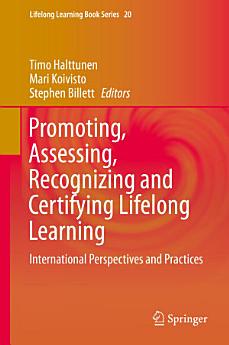Promoting, Assessing, Recognizing and Certifying Lifelong Learning: International Perspectives and Practices
Timo Halttunen · Mari Koivisto · Stephen Billett
ມ.ນ. 2014 · Lifelong Learning Book Series ຫົວທີ 20 · Springer Science & Business Media
ປຶ້ມອີບຸກ
302
ໜ້າ
reportບໍ່ໄດ້ຢັ້ງຢືນການຈັດອັນດັບ ແລະ ຄຳຕິຊົມ ສຶກສາເພີ່ມເຕີມ
ກ່ຽວກັບປຶ້ມ e-book ນີ້
This book offers an international perspective on the growing interest worldwide in lifelong learning, particularly as it relates to learning beyond compulsory education and initial occupational preparation: across working life. Much of this interest is driven by key social and economic imperatives associated with the changing requirements of work and working life, the transformation of many occupations and lengthening working lives. The concerns in lifelong learning are also associated with individuals being able to engage in learning about cultural and social topics and practices that they had not so far. It is important to understand how this learning can be assessed, recognized and certified. Many in workforces across the world learn much of the knowledge that is required to maintain their employability through that work. Yet, that learning and that competency remains without recognition and certification while this could be particularly helpful for individuals seeking to sustain their employability or to extend their work into new occupations or workplaces. The first section of this book sets out the overall project and outlines the key concepts and issues. It illustrates why there is a need for promoting and recognizing lifelong learning and explains some of the terminology, concepts and key considerations. The second section informs about a range of policies and practices that are currently being deployed or have been deployed across a range of countries within Europe, Scandinavia and Asia. The last section comprises of contributions emphasizing the ways in which the assessment of workers learning takes place in different occupational contexts and different cultural contexts. The final chapter outlines how a systemic approach to recognizing lifelong learning might progress for a country which is promoting a continuing education and training system largely outside of tertiary education institutions.
ໃຫ້ຄະແນນ e-book ນີ້
ບອກພວກເຮົາວ່າທ່ານຄິດແນວໃດ.
ອ່ານຂໍ້ມູນຂ່າວສານ
ສະມາດໂຟນ ແລະ ແທັບເລັດ
ຕິດຕັ້ງ ແອັບ Google Play Books ສຳລັບ Android ແລະ iPad/iPhone. ມັນຊິ້ງຂໍ້ມູນໂດຍອັດຕະໂນມັດກັບບັນຊີຂອງທ່ານ ແລະ ອະນຸຍາດໃຫ້ທ່ານອ່ານທາງອອນລາຍ ຫຼື ແບບອອບລາຍໄດ້ ບໍ່ວ່າທ່ານຈະຢູ່ໃສ.
ແລັບທັອບ ແລະ ຄອມພິວເຕີ
ທ່ານສາມາດຟັງປຶ້ມສຽງທີ່ຊື້ໃນ Google Play ໂດຍໃຊ້ໂປຣແກຣມທ່ອງເວັບຂອງຄອມພິວເຕີຂອງທ່ານໄດ້.
eReaders ແລະອຸປະກອນອື່ນໆ
ເພື່ອອ່ານໃນອຸປະກອນ e-ink ເຊັ່ນ: Kobo eReader, ທ່ານຈຳເປັນຕ້ອງດາວໂຫຼດໄຟລ໌ ແລະ ໂອນຍ້າຍມັນໄປໃສ່ອຸປະກອນຂອງທ່ານກ່ອນ. ປະຕິບັດຕາມຄຳແນະນຳລະອຽດຂອງ ສູນຊ່ວຍເຫຼືອ ເພື່ອໂອນຍ້າຍໄຟລ໌ໄໃສ່ eReader ທີ່ຮອງຮັບ.









